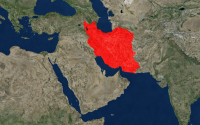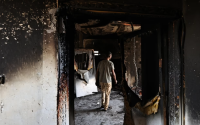10 May 2006Chris Spannos
We cannot say much about human affairs with any confidence, but sometimes it is possible. We can, for example, be fairly confident that either there will be a world without war or there won't be a world -- at least, a world inhabited by creatures other than bacteria and beetles, with some scattering of others.
-- Noam Chomsky, 2002 WSF speech
First, I'd like to comment on the premise of this paper. By war I mean the type of war waged between nations and states using military campaigns against each other. This paper adopts the premise that wars between nations have done exceptionally more harm than good; that truly civilized nations will develop means other than war to help remedy another country's injustice; that although war making is a choice taken by a nations elite, war has the effect of corrupting all; that all wars are bad and that it's time to envision and strategize for a world without war. But first, I'll attempt to explain the logic and rational used in arguing for a world without war.
First, some people may believe that seeking a world with out war is utopian, like seeking a world where birds ride bicycles or frogs play piano; such a world being just plain impossible. However, seeking a world without war is not the same as seeking a world where frogs and birds have the same capacities as human beings. There's a deeper reasoning behind the belief that aiming to win a world without war is utopian. This reasoning suggests that "war has always existed" and goes on to make the leap to also believe that therefore "war will always exist". The flimsiness of this logic is exposed when applied to diseases that were once incurable in the past, but which today can be treated and often times prevented. In addition, imagine the depression of coming to terms with the thought that war, despite efforts to stop it, is an inevitable feature of human existence. Anybody coming to such a conclusion should be horrified. It would be the equivalent of resigning ones' self to the existence of a horrible crime - say women not being able to vote. It would be like saying, before women's suffrage, that "because women have never voted in the past, women should never vote in the future"; therefore denying women's suffrage by making an irrational leap in logic and coming to an absurd conclusion. Just because war has existed in the past does not mean that it will exist in the future.
Second, someone may wonder about my premise that all wars are bad. They may ask "Are there any 'Just', 'Good' or 'Humanitarian' wars that prove your premise wrong?" There may be exceptions to the rule and I'll address this possibility below. But first let's assume that there isn't. Here's why…
A "Just War" is based on several assumptions. One of these assumptions is that if one side is evil, as the Fascists in WW2 undoubtedly were, then we can also assume that our side must be good. This illustrates another leap in logic where, because we identify an obvious bad (fascism) we assume that our side must be good. One only has to look at the civil rights denied to blacks in the US in the same period as WW2 to see the holes in this logic (without even mentioning the fact that Jim Crow racism continued to exist long after the end of WW2). This leads to the second assumption, that just because a cause is good or just, say stopping fascism, that the means of war to remedy the injustice is also good. One feels loss in the hope that there could have been alternatives to the bombing of Dresden, Hiroshima and Nagasaki. To achieve a world without war we'll have to consider alternatives to war in response to injustice or as a means of pursuing a just cause.
Regarding wars of "Humanitarian Intervention", i.e. the 1999 NATO bombing campaign of Yugoslavia and Kosovo, a common rational in these wars, as in many wars, is that the civilian population of one country must be saved i.e. from "atrocities against civilians", "ethnic cleansing", or a from a "modern day Hitler", etc. The country is bombed and invaded and civilian deaths, often increasing in number after invasion, are labeled "collateral damage", "accidental" or "unavoidable". These civilian deaths actually amount to indiscriminant killings of men, women and children. Any country waging war based on "Humanitarian Intervention" bares the burden of responsibility to prove they're doing more good than harm. A record of US military interventions where civilians were killed in the process of saving civilians shows more harm then good. (1)
Coming back to the possibility that there may be an exception to my premise that all wars are bad, there may be, it's certainly possible. However, I'm stilling willing to go out on a limb to state that wars between nations have done exceptionally more harm than good, and going further, that the material and social costs of war are of such great proportions, robbing humanity of vast potential, that war must be stopped as soon as possible (it should have been stopped long ago). If there is any such truly "good", "just" or "humanitarian" war, I'm sure it would not provide justification worthy of enduring the material and social costs of war.
Strategizing for a World Without War
What I attempt to do here is provide concrete short, medium and long term strategic goals and aims, just one possible path, to realize the hope that the future good society will abolish the act of war to the dust bin of history.
But first, what is an anti-war movement, its goals and aims? It's clear that an anti-war movement is a movement against war - to ask the question is to answer it. Those who are opposed to war and imperial domination seek to stop the wars that do break out as quickly as possible. We also want to prevent potential wars from breaking out and in the process checkmate imperial plans for future war.
The current "War on Terror" is a project of the US Empire and is a war based on lies and myths. The motive was to create a long-term war to ensure that elite concentrations of wealth and power would not be threatened, and to scare populations into accepting policies benefiting the rich and powerful. Seen in this light, Empire is used as a conduit for maintaining and increasing elite wealth, power and privilege; and war is the State's weapon to achieve these aims. Just as the current "War on Terror" is an immoral war based on lies and myths, history is full of wars of conquest and barbarism. It's the duty of an anti-war movement to raise consciousness and provide insight highlighting that not only is the current war immoral and wrong, but all war is immoral and wrong, and that war has many structural sources. So, we're faced with the task of providing vision for what a world without war would look like and how to get there. War is the product of many things and these things have their own forces and institutions, all of which have their roots in the underlying structures of society: militarism, capitalism, imperialism, racism, sexism and centralized political power, etc. Unless we address the root causes of war, the imperial wars of today and tomorrow will continue to rear their ugly heads into the future. Without exposing these structural sources of war, we face the very real prospect of fighting and resisting one war after another, without ever achieving victory.
Broadly, we'll need a strategy and vision which proposes to replace the current structures allowing war, militarism, Empire and imperialism with new structures, institutions and social relations exploring human development and liberation. Instead of today's economics of war, competition and greed, we need an economic vision for peace, solidarity and classlessness. Instead of the centralized politics of war and domination, we need decentralized participatory forms of decision making, justice and self-management. Instead of cultures of war and fundamentalism we need global culture cross-pollination, diversity and inter-communalism. Instead of a world threatened by ever looming environmental disaster we want a world with a sustainable and judicious interaction between humans, our built environment and the planet. Rather than a world based on fear and insecurity we want a world that provides hope and life for future generations.
The above means we'll need to fundamentally transform society's key defining institutions in all spheres of life. For the institutions of the economy I along with many others advocate Michael Albert and Robin Hahnel's Participatory Economy (Parecon) with its balanced job complexes, remuneration for effort and sacrifice, nested worker and consumer councils and decentralized participatory planning. For the polity, Stephen Shalom's "Parpolity" vision seems to be the top contending political vision complimenting the Parecon model. Shalom proposes nested councils for deliberation, decision making, adjudication, policy making, collective implementation and law for local, regional, national and international relations. For gender, sexuality and kinship vision, diversity of family arrangements among male, female, queers and communities, along with the socialization of care giving, will have divers kinship influences and outcomes for future generations. For cultural vision, I like the concept of "intercommunalism", which over simplified here, proposes to remove the material and social conditions which create hostile competition between communities. Rather, communities are guaranteed the resources necessary for their reproduction -- interacting among and with each other creating a rich diversity of cultures, ethnicities and religions. Individuals within these communities choose the religions, cultures and communities they themselves identify most with. For ecological vision we need much more imagination and discussion that seeks a sustainable and judicious interaction between human beings, our built environment and the planet. Over all I share the belief that lasting progress made on any one of these fronts depends on lasting progress made on all of these fronts.
The implication of all this for an anti-war movement is that we must provide multi-issue and multi-focused vision and strategy orienting ourselves with an overall vision for what a new society and world would look like. This new world will not include war making because it will have developed means other than war to help remedy another country's injustice and so will have abolished war to the past.
To move forward towards a world without war we need to begin by raising the social costs and consequences of war making. We have to ask the question "what will it take to win?" To win anti-war goals and aims means to end the current war now, stop tomorrows' war before it starts and checkmating imperial plans for future war. We know that the current "War on Terror" was based on a set of lies. The elite in the Bush administration and other complicit war making governments around the world also know of and used these lies. They are consciously waging a war to strengthen elite positions. Our movements should not waste time trying to change their minds, make them feel bad or even guilty about it. What we ought to do is make them stop their current war making as soon as possible. We need to create conditions which make it too costly for the elite to engage in war, because if they do, it will enlarge our movement. We should seek to create a context where continued war making will expand our movements' consciousness to the forces and underlying structures of war. Additionally, after becoming aware of these underlying structures allowing war, we need to propose new ones aligned with our vision for peace, justice and liberation. Our movements need to undertake a self-conscious effort to create conditions whereby the more war the elite make the more control they lose and the more power we gain.
A practical beginning to the process of raising the social cost of war making is to develop a diversity of strategies and tactics to affect what the war makers care about - profits, power and privilege. We can start by doing things that we already do, but with a new consciousness in mind about what our short, medium and long term goals are. We should reject the lies and myths used as rational for the "War on Terror" and the subsequent invasions and occupations of Afghanistan and Iraq. We can support soldiers refusing to fight and reservists refusing to serve. We can encourage munitions factory workers, and those loading weapons onto ships and air craft to strike against their participation in illegal war making. And, if we're not in the US, we can work to pressure our governments to not participate in US wars of invasion and occupation. But beyond these methods of resisting war, our movement strategies to raise the social cost need to broaden in depth, scale and scope. In January 2004, Arundhati Roy hit the nail on the head:
"I suggest we choose by some means two of the major corporations that are profiting from the destruction of Iraq. We could then list every project they are involved in. We could locate their offices in every city and every country across the world. We could go after them. We could shut them down. It's a question of bringing our collective wisdom and experience of past struggles to bear on a single target. It's a question of the desire to win." (3)Arundhati is right, it's a question of the desire to win. But what does wining look like?
Envisioning Structural Changes & Strategies for Conversion
"Every gun that is made, every warship launched, every rocket fired signifies, in the final sense, a theft from those who hunger and are not fed, those who are cold and are not clothed. The world in arms is not spending money alone. It is spending the sweat of its laborers, the genius of its scientists, the hopes of its children… This is not a way of life at all, in any true sense. Under the cloud of threatening war, it is humanity hanging from a cross of iron."- Former U.S. President, Dwight D. Eisenhower, in a speech on April 16, 1953
A so called "War on Terror" is being waged by the most militarily powerful country on earth. The "War on Terror" is a war for Empire. It's primarily only one country waging war and this war is of Cold War proportions. (4) The world spends some $1,083 billion annually on military expenditures. The US accounts for over half of that figure alone and has a military budget 8 times larger than that of the second runner up, China. (5) The material costs of Empire are high. These material costs are distributed throughout society with a small elite escaping their negative effects and reaping the material reward. The social costs of war and Empire are perhaps impossible to imagine -- all the training, skill and talent being used to wage war, to become killers and the killed. It seems difficult for the mind to grasp this social cost, even for the current "War on Terror", much less for a distant war from a distant past.
Our antiwar vision and strategy should seek to address these material and social costs of Empire building and in so raising the cost of war making for elites so that by making war they begin to lose control and we gain control. I propose structural changes for conversion of military industry and resources where we begin to gain control.One possible anti-war strategy could be to create a "Shadow Conversion Movement" which would include organizing and activism of all kinds. It could be a source for crafting and proposing alternative conversion policies and budgets. These budgets and policies could be voted on in a series of referendums enabling participatory processes for conversion strategies. These strategies would illustrate how the voted on shadow conversion plan would spend military budgets differently than the official budgets for national and international military spending. A shadow conversion plan would expose the material and social costs of war and how these costs could be better used for the social welfare of all. It would apply a variety of organizing efforts and activism to raise the social cost of making war. We could use media such as web sites, newsletters, analysis and commentary as well as demonstrations, education, lobbying, polls and petitions. It would present alternative budgets pressing for massive shifts in global and national financial expenditures away from military spending and towards social welfare spending. Nationally, this "shadow conversion" movement could propose health care, education, housing and welfare programs. Internationally it could critique existing expenditures on military aid, foreign policy and war making and in the process provide alternative foreign policy, and while demonstrating the differences, pressing for adherence to international law and holding war crimes tribunals. It could also provide strategies for withdraw of occupation forces from Iraq and Afghanistan, military bases from around the world, as well as propose reparations to countries where national rights were violated.In addition to war, militarism and foreign policy, such a military conversion shadow movement could also relate its insights to various other spheres of social life: economics, politics, culture, community, family and environmental issues; presenting challenges to government, military industry, corporations, media, and other institutions. Conclusion:After arguing that wars between nations have done exceptionally more harm than good; that truly civilized nations will develop means other than war to help remedy another country's injustice; that war making war has the effect of corrupting all; and that all wars are bad, this paper suggests a four pronged approach for an over all anti-war strategy, one possibility for winning a world without war:
(1) Create multi-issue and multi-focused anti-war strategies complimentary to other social movements seeking fundamental institutional changes in the economic, kinship, political, cultural and ecological spheres of society.
(2) Refuse to accept the legitimacy of the current "War on Terror" and refuse to accept all war and occupation. This can begin with already existing and ongoing anti-war organizing, resistance, demonstrations, outreach and movement building.
(3) Raise the social costs and consequences of elite war making by supporting soldiers refusing to fight in Afghanistan and Iraq, and supporting workers strikes and stoppages related to ongoing war making. Further strategies to raise the cost of war making for the elite include targeting specific corporations profiting from war and aim to bring them down. Once we've achieved our goals, let's pick more war profiting corporations and go after them; seeking to create conditions where elite war making causes our movements to grow and raise consciousness towards attempts at transforming the structural causes of war, further leading to a context where making war leads elites to losing ever more control and we gain ever more control. This can happen through…
(4) The creation of "Shadow Conversion Movements" generating ongoing alternative policies and budgets approved by participatory processes. These alternative budgets and policies can be used to critique national and international military budgets and expenditures and press for further conversion of military spending to social welfare spending. It can also critique foreign policy and support adherence to international law, as well as provide proposals for immediate withdrawal from war and occupation. A shadow conversion movement could extend its insights into other realms of social life including political, economic, cultural and kinship spheres.
Footnotes:
1. "Killing Civilians to Show That Killing Civilians is Wrong", by Zoltan Grossman, ZNet: http://www.zmag.org/grossmanciv.htm
2. 'The New American Century', The Nation, February 9, 2004http://www.thenation.com/doc/20040209/roy
3. ADM on-line: http://www.cdi.org/adm/1224
4. Center for Arms Control and Non-Proliferation: http://www.armscontrolcenter.org/archives/002244.php
http://www.zmag.org/content/showarticle.cfm?SectionID=11&ItemID=10237






